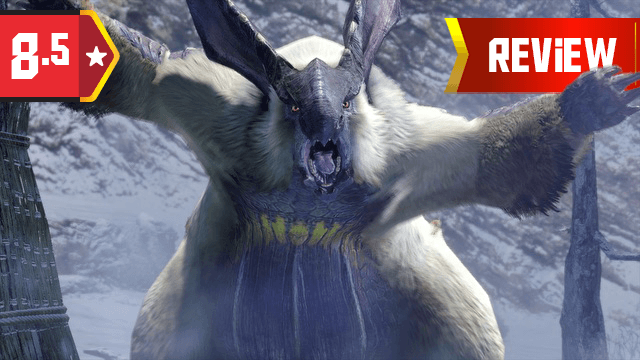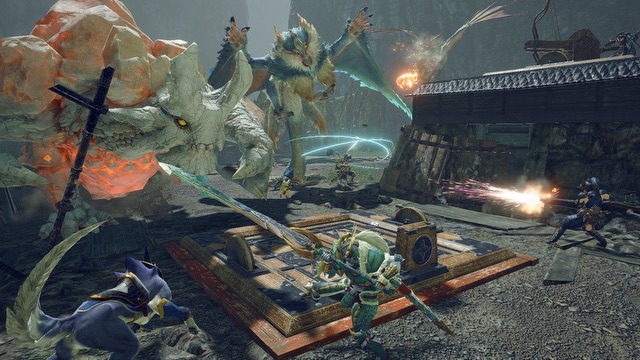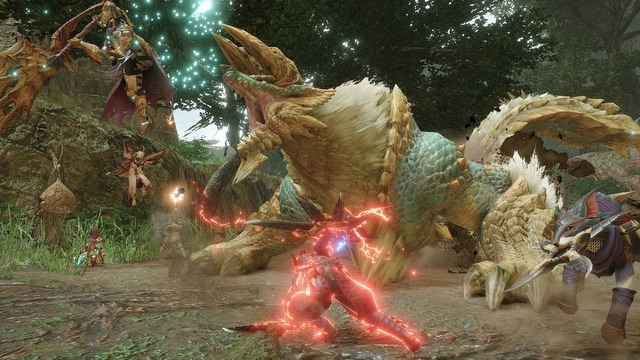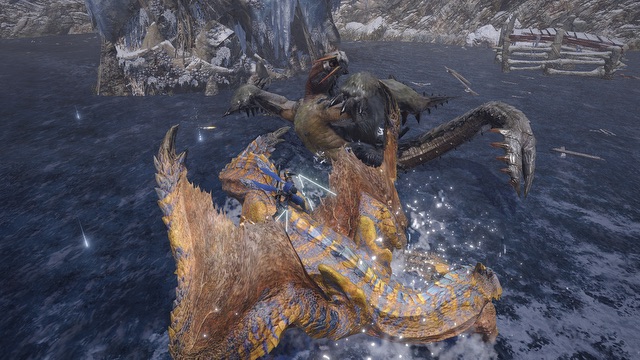Monster Hunter: World was a massive hit, with 17 million+ copies sold across PS4, Xbox One, and PC. The Switch missed out on the fun, but a game specifically for that system (and PC sometime next year), Monster Hunter Rise, has been in co-development and is finally about to release.
Since Capcom created Rise concurrently with Monster Hunter: World, players can expect many similarities. It has the same open-world design, which has players hunting monsters on one expansive map. The gameplay is similar as well, with all 14 weapon types carrying over and controlling almost exactly the same. When it comes to the core loop of hunting monsters, crafting gear, and hunting stronger monsters, Rise feels more like an expansion to World than a new game.
However, the transition to weaker hardware hasn’t done the series any favors. It runs smooth, which is a testament to Capcom’s development skills, but it does so at the cost of some of the smaller details that make Monster Hunter: World such an engaging title. However, it does include a few new mechanics that somewhat make up for this.
Big trouble in a little village
Rise takes players to Kamura Village and runs with a Japanese motif for the hub area. The story is a lot lighter this time around as you’re not exploring a whole new continent. Instead, you’re just a Kamura Village hunter who is just starting their career. Instead of chasing down Zorah Magederos and discovering the mystery behind the Elder Dragons’ migration, you’re just trying to keep your village safe.
In Rise, Kamura Village is put in danger by a phenomenon called “The Rampage.” For some reason, monsters in the surrounding areas are becoming more aggressive and sometimes even attacking the town in waves. This part of the story gives players access to a new survival-type mode where you have to defend the village from attack. Before and during the attack, you can set up defensive positions and give orders to NPCs. Solving the mystery behind these attacks is a big part of the plot, which seems to mostly exist in this game as an impetus for you to hunt monsters.
Kamura Village is much more compact than Astera or Seliana, which makes navigation easier. However, I found myself missing the hustle and bustle of the two hubs found in Monster Hunter: World. I also missed the hook in World that we were researching the beasts we were killing or capturing. It gave a deeper purpose behind hunting than, “Oh, that monster is causing a ruckus!” Kamura Village has a cool aesthetic, and the NPCs are likable; it just feels like a step backward.
Chop till you drop
Because the game is on the Switch, a console that many people play on the go, there are some changes to gameplay to make hunts more streamlined. For one, you no longer have to discover major monsters to track them on the map. Cahoots, the new owl companion that replaces Scoutflies, automatically places markers for each major monster on the map. The icons don’t initially tell you which creature is which, but this eliminates the need to follow tracks and environmental clues to find major monsters.
The Palamutes are one of two big additions to the game, and stand alongside the Felynes as companions. These new dog buddies fight alongside you in battle, but most importantly, you can ride them on hunts. Being able to ride Palamutes basically puts each hunt into turbo mode because they’re significantly faster than the player character, and you expend no stamina when you’re riding them. You can use many items while on your Palamute, like the Whetstone, rations, and potions, which means you can get prepared to fight while traveling to your target.
The wire
Hunters also get a new tool to use in Rise, the Wirebug, which acts as an evolution of the Clutch Claw introduced in Monster Hunter World: Iceborne. This tool lets you launch into the air to dodge an enemy attack quickly or to traverse gaps. It also allows for more verticality, as you can use Wirebug charges in quick succession to climb to places you otherwise couldn’t reach.
The Wirebug also introduces the Silkbinding mechanic. The Wirebug can be used in conjunction with your main weapon to produce new combos. These combos, when landed correctly, can snare a monster, allowing you to engage in Wyvern Riding. However, Wyvern Riding can also be made possible when a monster gets knocked down during a Turf War, something that is more common in Rise than in World.
Wyvern Riding allows you to mount a monster, and instead of just attacking them, you get a limited amount of control over them. You can use strong and weak attacks on an enemy or cause the monster to slam itself into the nearest wall. There’s also a gauge you can fill up by evading or landing attacks when Wyvern Riding that allow you to execute a Mounted Punisher attack which causes major damage to an opponent.
Because of the increased opportunity to do damage with Wyvern Riding, hunts are typically over much quicker in Rise. Fights later in the game are still tough, but some of the monsters that were challenging for early players in World, like the Pukei-Pukei, are much easier to take down.
The world is not enough
While Rise nails the fundamental gameplay of Monster Hunter, it feels lacking when it comes to worldbuilding. One of the things that drew me into Monster Hunter: World is how thought out each monster’s place in the environment is. I loved that you had to track monsters, spying out footprints, disturbed plantlife, and excrement.
Unfortunately, though the maps are large in Monster Hunter Rise, they don’t feel quite as natural as those found in World. Rise’s locations feel more like video game maps, with medium-sized arenas to fight monsters in connected by narrower corridors. There are less shortcuts and cramped passages than in World, which leaves each map with a constructed feeling.
The amount of endemic life also seems to be toned down. Instead of having a ton of critters to capture in nets and collect, most of the endemic life is are either items to pick up (Dung Beetles), instant use (Flashbugs), or the new Spiritbirds that buff you as you collect them.
Most players likely won’t notice that Rise puts less emphasis on worldbuilding, but it was disappointing to me. Rise has great gameplay, but there’s a lot more emphasis on the hunt. It’s likely a side effect of the game being on Switch more than anything, which makes me wish that it was a second expansion to Monster Hunter: World rather than a separate title.
Monster Hunter Rise | The Final Verdict
Capcom did an amazing job distilling the gameplay experience of Monster Hunter: World into a streamlined form for the Nintendo Switch. Hunts are easier to get into and faster to complete, but they still give the challenge that fans loved from previous games. There’s also just enough new mechanics to make Rise feel like a step forward, even if it’s only a small one.
Fans who love Monster Hunter exclusively for the hunts will likely welcome the raised emphasis on taking on major monsters as quickly as possible. However, Rise is missing some of the worldbuilding of Monster Hunter: World, which will make it feel a bit emptier for players who prefer to stop and smell the roses.
-
Steamlines the experience to make it more mobile-friendly.
-
Performs exceptionally well on the Switch.
-
Quality of life improvements eliminate some of the more frustrating parts of hunting.
-
Missing a lot of the world building elements of Monster Hunter: World.












